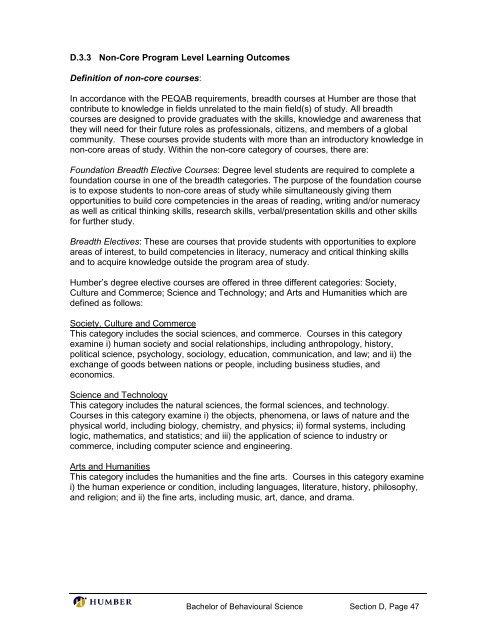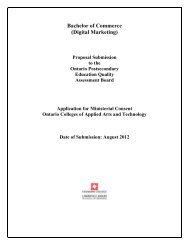Bachelor of Behavioural Science - Postsecondary Education Quality ...
Bachelor of Behavioural Science - Postsecondary Education Quality ...
Bachelor of Behavioural Science - Postsecondary Education Quality ...
Create successful ePaper yourself
Turn your PDF publications into a flip-book with our unique Google optimized e-Paper software.
D.3.3 Non-Core Program Level Learning Outcomes<br />
Definition <strong>of</strong> non-core courses:<br />
In accordance with the PEQAB requirements, breadth courses at Humber are those that<br />
contribute to knowledge in fields unrelated to the main field(s) <strong>of</strong> study. All breadth<br />
courses are designed to provide graduates with the skills, knowledge and awareness that<br />
they will need for their future roles as pr<strong>of</strong>essionals, citizens, and members <strong>of</strong> a global<br />
community. These courses provide students with more than an introductory knowledge in<br />
non-core areas <strong>of</strong> study. Within the non-core category <strong>of</strong> courses, there are:<br />
Foundation Breadth Elective Courses: Degree level students are required to complete a<br />
foundation course in one <strong>of</strong> the breadth categories. The purpose <strong>of</strong> the foundation course<br />
is to expose students to non-core areas <strong>of</strong> study while simultaneously giving them<br />
opportunities to build core competencies in the areas <strong>of</strong> reading, writing and/or numeracy<br />
as well as critical thinking skills, research skills, verbal/presentation skills and other skills<br />
for further study.<br />
Breadth Electives: These are courses that provide students with opportunities to explore<br />
areas <strong>of</strong> interest, to build competencies in literacy, numeracy and critical thinking skills<br />
and to acquire knowledge outside the program area <strong>of</strong> study.<br />
Humber‘s degree elective courses are <strong>of</strong>fered in three different categories: Society,<br />
Culture and Commerce; <strong>Science</strong> and Technology; and Arts and Humanities which are<br />
defined as follows:<br />
Society, Culture and Commerce<br />
This category includes the social sciences, and commerce. Courses in this category<br />
examine i) human society and social relationships, including anthropology, history,<br />
political science, psychology, sociology, education, communication, and law; and ii) the<br />
exchange <strong>of</strong> goods between nations or people, including business studies, and<br />
economics.<br />
<strong>Science</strong> and Technology<br />
This category includes the natural sciences, the formal sciences, and technology.<br />
Courses in this category examine i) the objects, phenomena, or laws <strong>of</strong> nature and the<br />
physical world, including biology, chemistry, and physics; ii) formal systems, including<br />
logic, mathematics, and statistics; and iii) the application <strong>of</strong> science to industry or<br />
commerce, including computer science and engineering.<br />
Arts and Humanities<br />
This category includes the humanities and the fine arts. Courses in this category examine<br />
i) the human experience or condition, including languages, literature, history, philosophy,<br />
and religion; and ii) the fine arts, including music, art, dance, and drama.<br />
<strong>Bachelor</strong> <strong>of</strong> <strong>Behavioural</strong> <strong>Science</strong> Section D, Page 47
















